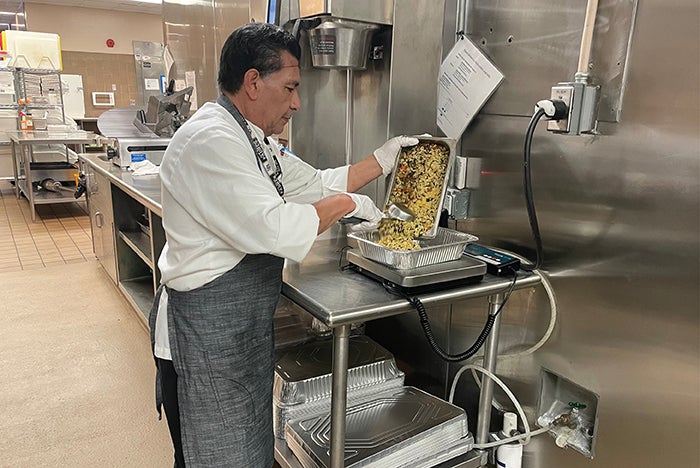California hospitals form partnerships on food recovery programs

Through its food recovery initiative, UC San Diego Health has identified opportunities to adjust its menus and food production process to reduce waste.
Image courtesy of University of California San Diego Health
Landfills are the third-largest source of human-related methane emissions in the country, according to the Environmental Protection Agency. So, when California Senate Bill 1383 (SB 1383) took effect in 2022, mandating organizations serving or selling food to reduce food waste, hospitals could be certain they were mitigating their impact on climate change. These same hospitals have also found this requirement encourages new strategies that support population health.
SB 1383 impacts health facilities with on-site food production and 100 or more licensed beds. But Dignity Health, headquartered in San Francisco, is encouraging all its facilities — no matter the bed count — to join in its partnership with Replate, a food recovery organization that connects companies with surplus food to local community organizations.
“We usually provide grab-and-go items close to expiration, like salads, sandwiches and yogurts. We also provide leftover food that has not been served in our cafe,” explains Kevin Leitner, nutrition services director for Dignity Health’s Marian Regional Medical Center in Santa Maria, Calif. Food is cooled and provided weekly to the nearby Rescue Mission Alliance Central Coast, which distributes it to people in need.
Working with organizations that coordinate donations can simplify the complexity of managing partnerships across multiple locations. Sutter Health, headquartered in Sacramento, Calif., uses a software called Copia that helps organizations donate surplus food. The software has provided invaluable support in facilitating donations from 16 Sutter Health hospitals to 45 nonprofits across Northern California.
These third-party organizations can also ensure hospitals’ donations match nonprofits’ needs. In relaunching its food recovery program in 2023, University of California San Diego Health (UC San Diego Health) partnered with a company called Food Donation Connection, headquartered in Knoxville, Tenn.
“They are able to connect us with some of their local nonprofits based on the types of products we are donating and delivery and pickup schedules,” explains Jill Martin, senior director, food and nutrition services, UC San Diego Health.
An added advantage is that Food Donation Connection maintains records of the food donated. To date, three UC San Diego Health sites have donated approximately 1,500 pounds of food every month, a number that Martin says is “both good and bad.” She explains, “We want to help, but we also want to … make sure we’re not overproducing.”
As health systems gather data on the types of food donated, they can use that information to adapt recipes. For further insight, UC San Diego Health has deployed dietetic interns to perform plate waste studies. This has uncovered opportunities to combine the menus used for patients and retail sales to maximize use of the same ingredients. The system has also updated its production processes to keep products fresh longer.
While food recovery programs have a major impact on communities, health systems report that the impact on staff workflow is minimal. For example, once Sutter Health employees weigh excess food and submit food donations through Copia’s software application, Copia dispatches drivers to pick up and deliver it.
Martin explains that getting the food services team involved early helps secure buy-in. “They understand the impact they’re having by making these changes in their workflow, and that is really important to them,” she says. “They know that they’re making a difference.”
“The benefits are priceless,” Leitner agrees. “I see hundreds of meals go into peoples’ hungry stomachs rather than in the trash.” In the five months since the launch of Marian Regional’s food recovery initiative, those donations have amounted to 1,952 pounds of food, 1,627 meals and more than 4,000 pounds of diverted carbon dioxide (CO2).
In 2023, Sutter Health’s facilities delivered 82,300 pounds of food for 68,600 meals across the Bay Area and Sacramento Valley. In diverting this food from landfills, the system kept 253,400 pounds of CO2 emissions out of the atmosphere.
Food donations are the most impactful strategy for reducing food waste, but not all waste can be donated for human consumption. That’s why UC San Diego Health also donates approximately 40,000 pounds of pre-consumer organic waste each month — things like broccoli stems and carrot and berry tops — to a company that uses it as hog feed. Post-consumer waste is composted, where organic waste can break down in an oxygen-rich process that is methane-free.




